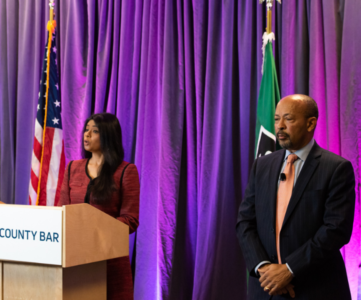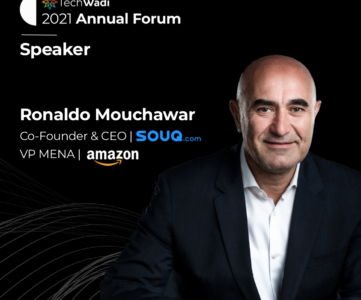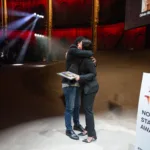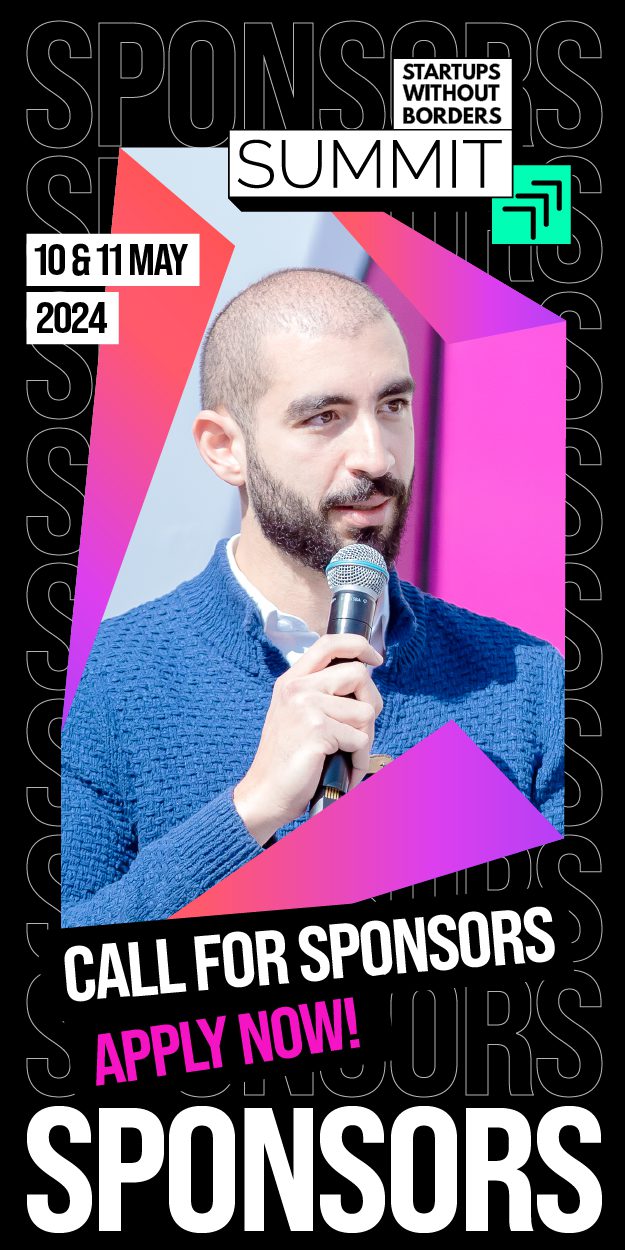She arrived to the US at 18, with only 1.000 in Her Pocket. How did this power woman build a tech empire, listed as one of Inc’s 5000 companies?
By Valentina Primo
Like a tornado, like a force of nature unravelling from East to West, Rania Hoteit has been leaving an indelible imprint in the American tech space. A tech entrepreneur, a public speaker, and the founder of a company that was just listed as one of America’s top 5000 by Inc, Hoteit does not fear or hesitate. But it took a long journey, one plagued with isolation, displacement, and the memories of war, to get to that state.
“At the age of 18, my entire life had split. I said goodbye to my country, boarded the plane, and moved to the United States alone with only $1,000 in my pocket, no set plan, no clear vision of the future, and absolutely no idea how I would survive,” she narrates, recalling the moment she decided to leave her home in war-torn Lebanon.
A young immigrant with big dreams and unshakeable strength, Hoteit faced isolation, discrimination, and gender barriers. “I was a full-time student, working multiple jobs and with little savings to nothing. My circumstances were anything but ideal to take such risks. I didn’t go to college to study business, neither did I have mentors. So I had to invest the effort and time to acquire knowledge and expertise all on my own,” says Hoteit, a power woman who turned adversity into a powerful drive to push through the walls of fear and become a genuine leader, now inspiring women across the world to build leadership skills.
 Just last month, her tech company ID4A was listed as one of Inc.5000’s list of “America’s Fastest Growing Private Companies“, now sharing a pedigree with dozens of companies that have gone to become household names. How did she do it all? We talk to the Lebanese entrepreneur about her journey, her company, and the secret sauce to turn barriers into opportunities to rise.
Just last month, her tech company ID4A was listed as one of Inc.5000’s list of “America’s Fastest Growing Private Companies“, now sharing a pedigree with dozens of companies that have gone to become household names. How did she do it all? We talk to the Lebanese entrepreneur about her journey, her company, and the secret sauce to turn barriers into opportunities to rise.
Tell us about your journey from Lebanon. How did it inspire you?
My journey coming from Lebanon inspired me in different ways. There were both negative and positive factors that shaped my identity and influenced my trajectory in life. I grew up in Beirut during the Lebanese civil war, when violence was at its peak in the late 80s. Our house was bombed several times, and our lives were under constant threat. At some point, my family managed to escape from Beirut to the South of the country, then we fled to Syria and Jordan, and settled in Egypt until the war officially ended.
But going back home meant a complete start-over. Our way of living had completely transformed, a new set of challenges emerged, and instability increased as a result. The scars of war didn’t only engrave memories of anxiety, loss, tragedy, destruction, displacement and economic hardships; they also marked irreversible damage on our solidarity as a family. So I said goodbye to my country, boarded the plane, and moved to the United States alone with only $1000 in my pocket, no set plan, no clear vision of the future, and absolutely no idea how I would survive.
“The scars of war didn’t only engrave memories of anxiety, loss, tragedy, destruction, displacement and economic hardships; they also marked irreversible damage on our solidarity as a family.”
I was frightened. Being exposed to adversity from a young age was the super power that I used to push through fear and to discover passions, talents and strengths that I never knew existed. In that sense, the negatives inspired me to carve my own path and find my own purpose rather than fitting expectations or surrendering to limitations.
Simultaneously, other positive factors were extremely advantageous to my personal growth and career development in the long run. Being raised in a multicultural environment gave me the ability to open my mind, shift perspectives, and consider alternative ways of thinking. Speaking three languages broadened my communication skills, increased my problem solving capabilities, and enhanced my understanding of rituals, social cues and triggers of people from all walks of life. Coming from such diverse experiences, outlooks, and social skills contributed immensely to the expansion of my global leadership and influence, as well as scaling my entrepreneurial operations internationally.
So you arrived in the US at 18 with nothing but $1.000. What do you think was a key to getting to where you are?
Resilience was the key. The obstacles and struggles that I had to navigate through as an immigrant, a young woman, and a self-starter in a new country were tremendous. Aside from financial insecurity and separation with my family, I had no support or guidance.

Hoteit was recognized by Inc. Magazine amongst America’s Top Entrepreneurs leading the Most Inspiring Companies of 2018.
Coming from the Middle East as an Arab woman, I was being systematically isolated.Discrimination by classmates, teachers, and work colleagues became usual encounters for few years. Then during the early stages of starting my business, I had to break through many gender barriers. It was a defining moment when I decided to become an entrepreneur.
“Coming from the Middle East as an Arab woman, I was being systematically isolated.”
I was a full-time student, working multiple jobs and with little savings to nothing. My circumstances were anything but ideal to take such risks. I didn’t go to college to study business, neither did I have mentors. So I had to invest the effort and time to acquire knowledge and expertise all on my own.
But these hardships awakened my determination and fuelled my desire to succeed. I stayed firm in my decision and continued to move forward against all odds. If I had ever given in or yielded to any adversary force, I wouldn’t have arrived to where I am today.
What would you advise someone who is in a similar situation today?
Immigrants like myself normally leave their homes and countries of origin in search of a better reality, with the hope of finding security, safety, opportunity and success elsewhere. This journey is seldom smooth, and it often entails major difficulties, challenges and even tragedies that others might not relate to.
But whether you are an immigrant or not, when you know who you are, you start the journey of creating your experiences rather than surrendering to circumstances. And whether you bounce back from adversity or you fall apart, it’s the strength of your character that will determine if you’ll reach your highest potential and achieve success, or if you’ll settle for a mediocre life.
“Whether you are an immigrant or not, when you know who you are, you start the journey of creating your experiences rather than surrendering to circumstances.”
My first advice is to develop a deep understanding of yourself, make realistic assessments of your current situation, then decide who you want to become and what you want to achieve ultimately. Once you get clear on that, you’ll be able to strategize short skilful executions and take transformative actions that lead to positive changes in your life and move you towards your goals.
However, if you want to grow and improve your life, you have to be willing to weather the whirlwinds, and do everything you can despite everything that gets in your way. My second advice is to master resilience. Resilience is a critical ability to master within yourself and in relation to the world around you, including accepting unpredictability, acknowledging a multitude of perspectives, and adapting to change as quickly as possible; regardless if it’s geographical, cultural, emotional or economic.
You’ve built a company that’s now become a giant. How did you get in your field – in particular, as a woman in tech and manufacturing?
There is a background history that led me into these industries; while I was still a student, I became an entrepreneur and successfully grew and sold 2 companies. I launched my first business when I was in undergraduate studies, and the second one when I was completing my first Master’s degree. At the core of it all, my passion always lied in exploring innovative paradigms that bridge humanities and design with technology and business. I came from engineering, into industrial design, architecture and branding.
“At the core of it all, my passion always lied in exploring innovative paradigms that bridge humanities and design with technology and business.”
Then, I pursued a dual masters in production design and architecture with a thesis focus on emerging technologies and disruptive fabrication processes; where I developed advanced methodologies that combined programmable materials and computational design, with machine vision, 3D printing, and industrial robotics capabilities to accelerate production. These developments became the foundation for launching my third business. I founded ID4A at the end of 2011 in Los Angeles, then I moved the company to San Francisco at the end of 2013 and launched operations out of Silicon Valley only 3 months after graduating from my second Master program.

However, managing to lead in such a competitive environments was never easy. During the initial launch of ID4A, we were entering an intensive R&D phase that was demanding both in finances and highly skilled talent in different areas of engineering, material sciences, robotics, and computer science. These industries are historically male dominated. Being a woman who is innovating and seeking to raise investment, I was facing nothing but prejudice, sexism, skepticism, and lack of support.
Despite all this, I had a strong belief in my vision and ability to consolidate my multi-disciplinary expertise into a cohesive, operational business entity that can add great value to customers with the solutions we provide, and our deep understanding on multiple fronts: exponential technologies, product development workflows, as well as manufacturing processes and production pipelines.
I took major financial risks and prioritized innovation over monetization. We went ahead with our R&D to prove that we can optimize and accelerate the production cycle by effectively leveraging different technologies, which eventually led us to pitch our processes and sell them to businesses in the manufacturing industry who adopted them for a variety of industrial applications. This was the initial success that positioned the company at the forefront. We developed a unique B2B business model that allowed us to expand by building strategic partnerships and collaborations with corporate R&D labs and startup companies who can benefit from our automation technologies as well as our end-to-end product development services.
Creating value-added innovation as well as strategic thinking and agile execution were critical to the expansion and sustainable growth of my business later on. In 2016, we earned a rank on Entrepreneur 360 List of the “Best Entrepreneurial Companies in America” for mastering impact, innovation, growth, and leadership; and we were recognized by the The White House for fostering the development of advanced manufacturing in the USA as the world.
Do you think migrant entrepreneurs are recognized for their contribution in the innovative spectrum in the US?
Although migrant entrepreneurs have historically been major catalysts behind economic growth and key drivers of American innovation, I don’t think that they’ve been recognized enough for their contributions. But as a general reminder, boosting economic growth means increasing the number of people working, and one way to get more people working is to increase immigration.
“43% of Fortune 500 companies were started by immigrants and their children.”
It’s no coincidence that the United States is a ‘nation of immigrants’, it’s by design. Further economic evidence shows that, in addition to boosting economic growth, immigration increases innovation and leads to a positive impact on wages of native-born workers as well. Studies have shown that 30-50 percent of the aggregate productivity growth in the US between 1990 and 2010 was driven mainly by high-skilled immigrants in STEM innovation: Scientists, Technology professionals, Engineers, and Mathematicians.

This year, she was nominated for the Lebanon Impact Awards, Diaspora category, organized by the Global Changemaker Festival.
Specifically when it comes to entrepreneurship, immigrants have been starting and running enterprises of every type and scale, from small businesses to high-growth tech companies and major corporations. Based on the latest Fortune Magazine report, 43% of Fortune 500 companies were started by immigrants and their children. The National Foundation for American Policy reported that over half of billion-dollar tech unicorn companies have an immigrant co-founder.
In other words, immigrant entrepreneurs are critical to the growth of top American ecosystems, creating jobs, and bringing global relationships to produce billion-dollar startups that create even more jobs. But, despite all evidence of the positive impact on the economy, the federal government has recently worked to limit immigration, and policy has been disturbingly pushing migrant entrepreneurs away rather than welcoming and enabling them to launch high-growth startups by eliminating international programs and making visas so difficult to attain.
In the midst of vitriol politics, racial favouritism, and cross-cultural incompetencies, the situation in the US hasn’t been easy.
What does the recognition by Inc. mean to you?
In a world where many people carve their way into fame through paid publicity and advertising without having any real substance or adding true value; and where women entrepreneurs remain undermined and overshadowed by male dominance across industries as media coverage, this is the type of earned recognition and successful leadership that no one can buy and no gender bias can deny.
That said, I am extremely proud of all the achievements that my company and I earned over the years, merely through hard work, value-added innovation, and game-changing contributions both at industry level and in social impact. For me, it’s an honor to be recognized by Inc. amongst ‘America’s Top Entrepreneurs’ who are leading the ‘Most Inspiring Companies in 2018’, and for ID4A Technologies to be recognized on the Elite 2018 Inc.5000 List of the “Fastest Growing Private Companies in America” under my leadership. Nothing can be more fulfilling than true success that is backed by tangible results and a substantial track record that is powered by vision, innovation, unwavering commitment to excellence, and uncompromising moral standards.
Photos courtesy of Rania Hoteit.
Photography by Taylor Boone. All Rights Reserved ©️Rania Hoteit.


